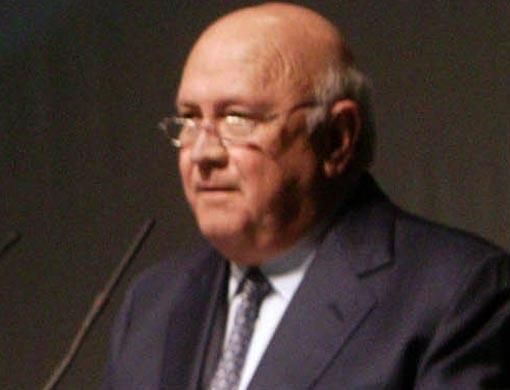Dubai: Former South African President F.W. De Klerk has said that African National Congress President Jacob Zuma's corruption cases must be finalised before the 2009 elections.
"If he [Zuma] becomes the leader with the cloud still around his head - he might be guilty of serious corruption charges - it will not be good for South Africa," De Klerk told Gulf News.
"South Africa will have to accept whoever the ANC [African National Congress] - if it wins the next elections - makes the president. No country wants a president who is under suspicion and where the court hasn't made a decision.
"The best case scenario is the case must be finalised, before he becomes president," De Klerk said.
However, he continued on the likelihood of Zuma's election. "But there are voices in the ANC that says it's not sure if he will be the president of the ANC. We'll have to see what happens," he said.
Zuma has faced a number of corruption charges - the most recent of which were thrown out on September 12 this year, on a legal technicality.
The National Prosecuting Authority then announced it would appeal the decision, after which the ANC forced its then President Thabo Mbeki to resign.
On October 22, a South African judge ruled that public prosecutors would be allowed to appeal against Zuma's acquittal.
Zuma faces charges of racketeering and money laundering, two charges of corruption and 12 charges of fraud surrounding a government arms deal. He was charged back in 2005 and was recharged in December 2007, eight days after he won the ANC party leadership from Mbeki.
Zuma has denied the charges and said he will step down only if the court proves him guilty. He also claims the charges - which he has denied - are politically motivated.
Key issues
Back in 2006, Zuma was acquitted of raping the daughter, who is HIV-positive, of a family friend, telling the court that he showered afterwards to prevent transmission of the virus. Gulf News canvassed South African expatriates in Dubai, who expressed concern over the future of their country.
The rise in violent crime over the last 15 years, the introduction of the Black Economic Empowerment affirmative action policy after 1994 (seen as reverse racism by some white South Africans) and the influx of migrants from neighbouring African states were cited as the main issues. White South Africans, some say, are now facing difficulty finding employment, and are increasingly emigrating abroad, for instance to the UAE and UK.
"Zuma is either going to make or break South Africa," one Dubai-based expatriate told Gulf News, continuing that she and her family would not be returning to South Africa, because of the violent crime rates.
De Klerk spoke of the development of South Africa, at the Green Dubai World Forum 2008, held on October 24 in Dubai.
"Nineteen years ago when I became President, South Africa was confronted with the urgent need to change. The political and economic environment in which we found ourselves was disastrous. We were facing international isolation and a growing downward spiral of conflict and repression. During the subsequent five years we succeeded in changing our environment and in creating new and more positive realities."
Dubai F.W. De Klerk was inaugurated as President of South Africa after the general election of September 6, 1989. He served in the post of State President until the inauguration of President Nelson Mandela on May 10, 1994.
Throughout this period, he both initiated and presided over negotiations for the abolition of the Apartheid and the steps that lead to the adoption of the democratic constitution in December 1993.
De Klerk is the recipient of numerous awards, including the Prix du Courage Internationale (Prize for Political Courage) and is co-recipient of the Unesco Houphouet-Boigny Prize, both in 1992.
He was jointly awarded the Nobel Peace Prize in 1993 with Nelson Mandela, who were both awarded the order of Mapungubwe: Gold, for contributions to the peace process, national reconciliation and nation building in South Africa.
F.W. De Klerk also founded the Global Leadership Foundation.
What is your opinion on the issue? Should candidates with court cases be allowed to contest elections? How practical are de Klerk's suggestions in the context of South African politics?













